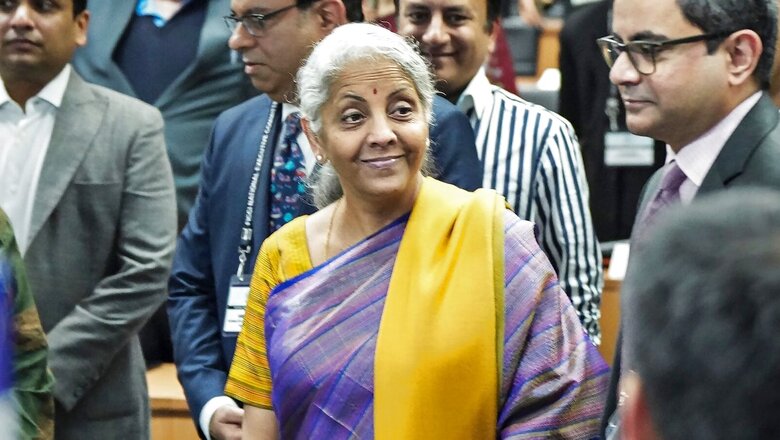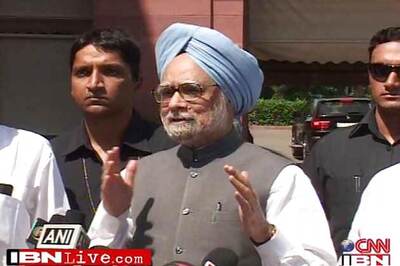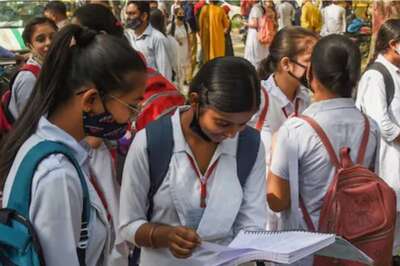
views
Following the Russia-Ukraine war in late February 2022 that also led to the worsening of the inflation situation in India due to constrained supply, the Reserve Bank of India (RBI) put inflation first and growth next. However, in December 2022, the retail inflation declined to a one-year low of 5.72 per cent, to well within the RBI’s comfort range of 2 per cent-6 per cent for a second month, data released by the Ministry of Statistics & Programme Implementation (MoSPI) on January 23 showed. RBI Governor Shaktikanta Das last week even said that “inflation had started to soften" and “the current account deficit seemed manageable".
Is it then time for the RBI to focus on growth?
As Rahul Joshi, Group Editor-in-Chief, Network18, spoke to Union Finance Minister Nirmala Sitharaman exclusively, two days after she presented the Budget on February 1, she said, while she wouldn’t want to guide the RBI, broadly speaking, “the pressure on the central bank has reduced".
Why was there no mention of disinvestment and asset monetisation in the #BudgetSpeech? FM #NirmalaSitharaman answers (@nsitharaman)#FMToNetwork18 #UnionBudget2023 #Budget2023 #MegaExclusive | @18RahulJoshi @nsitharamanoffc pic.twitter.com/MgliqZcV8P? News18 (@CNNnews18) February 3, 2023
When asked if the RBI can take a more relaxed view of monitoring, tightening and support growth in the coming months, Sitharaman said, “In a broader way, the way in which the inflation has come down, through the RBI’s and government’s actions… The government action has been steady and [the government] has been at it for some time. The fall in inflation doesn’t seem to be a momentary or a one-month affair. It should sustain itself in the process of coming down. There shouldn’t be that much pressure on the central bank to keep the pace of increasing the rates. But the Monetary Policy Committee (MPC) will take a call."
INFLATION & GROWTH
Explaining why they had to prioritise inflation over growth, Das had, in May 2022, said that the RBI’s primary target before the Russia-Ukraine war was to focus on growth and to tolerate inflation up to 6 per cent. “Intermittently, during this period, inflation spiked to 6 per cent and above; on one or two occasions, it even touched 7 per cent??
India’s retail inflation accelerated to a five-month high of 7.41 per cent in September. It was the ninth month that the Consumer Price Index (CPI)-based inflation had remained above the RBI’s upper tolerance limit of 6 per cent, and had risen despite the central bank’s efforts to curb it. The retail inflation stood at 7.04 per cent in May, 7.01 per cent in June, 6.71 per cent in July, 7 per cent in August and now 7.41 per cent in September.
Retail inflation came to a one-year low of 5.72 per cent in December 2022, mainly due to softening prices of food items.
In December, the RBI’s rate-setting panel revised its forecast for real gross domestic product (GDP) growth downwards to 6.8 per cent. “Even after this revision in our growth projections, India will still remain among the fastest-growing major economy,? Das had said. The World Bank, however, revised upwards India’s GDP growth forecast for the financial year to 6.9 per cent due to robust economic activities in the country, from the 6.5 per cent estimated earlier. It expected the retail inflation at 7.1 per cent in 2022-23, according to the World Bank’s latest India Development Update.
#Exclusive | "It isn't a funding winter or scarcity of funds. Investors want to look at better options. Will be speaking about the debt situation globally at G20": FM #NirmalaSitharaman (@nsitharaman) to News18's @18RahulJoshi#FMToNetwork18 #Budget2023 | @nsitharamanoffc pic.twitter.com/HaRsDnsc5H? News18 (@CNNnews18) February 3, 2023
?STABLE?: BANKING SYSTEM AND TWIN DEFICITS
The banking system overall too is now stable, according to the FM. “Both the RBI and Financial Stability Board (FSB), which meets once in six months, know that the Indian banking system, having gone through the twin balance sheet problem, is at a comfortable level?With their Non-Performing Assets (NPAs) coming down to absolutely low levels, recoveries happening, their position is very sound. It reflects when they go to raise money in the markets, they are absolutely comfortable….The entire macroeconomic analysis, which any expert would do, would show how comfortable the banks are…," the FM said.
The ‘twin balance sheet problem’ is a situation in which corporations are overleveraged on the one hand, and banks are saddled with bad loans on the other.
“Twin deficits are not as severe as before. When exports come down, you are going to have current account deficits…It is also going up. Imports also keep going up and down. Monthly fluctuations should not worry us. If every month there is a steady decline, but there is no sign of uptick predicted, we should worry. Monthly fluctuations should not worry us," she said.
A twin deficit problem occurs when there is a simultaneous rise in both fiscal and current account deficits. A fiscal deficit occurs when expenditure is higher than income.
Read all the Latest Business News here



















Comments
0 comment